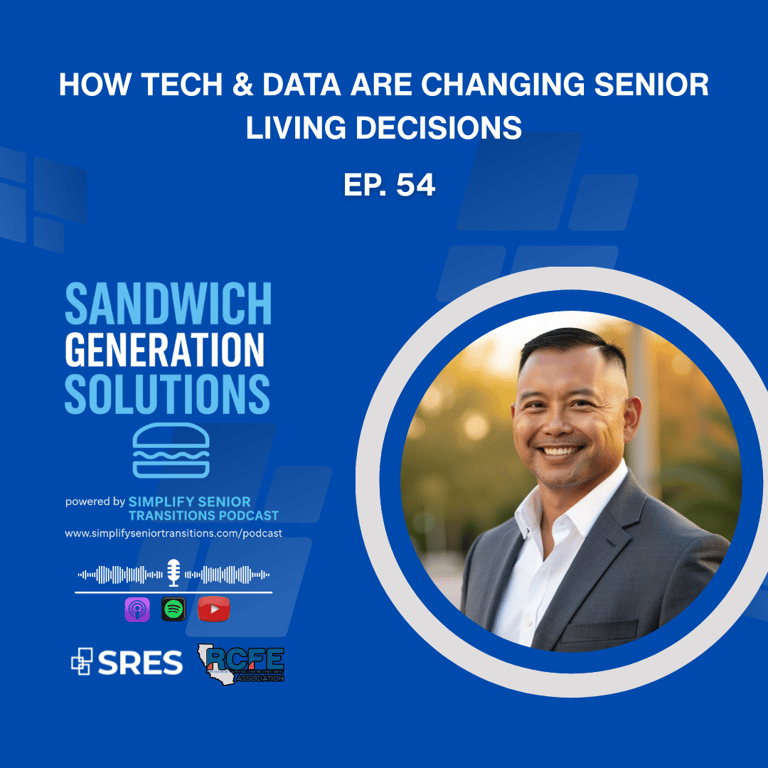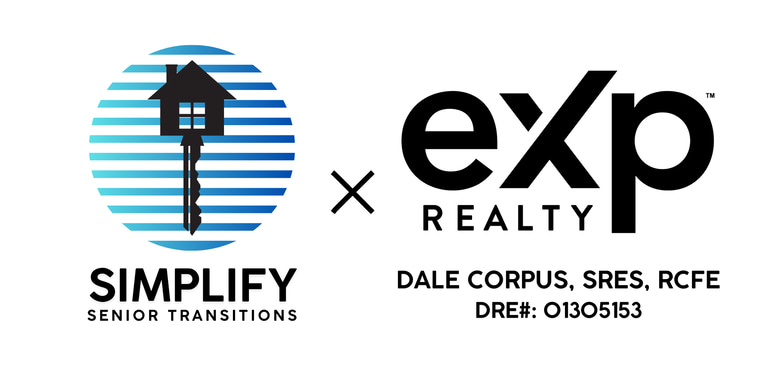Proactive Care Through Tech: A Bay Area Guide for Families
From wearables to smart homes, discover how technology helps seniors stay independent and families stay informed.
Dale Corpus
8/28/20254 min read
Navigating Senior Living: How Tech & Data Bring Peace of Mind to Bay Area Families
Life in the Bay Area is fast-paced, isn't it? Many of us are part of the sandwich generation—juggling careers, raising kids, and providing crucial support for our aging parents.
This unique stress is something I know well, and it's why I'm passionate about sharing solutions that make this stage of life a little easier for families like yours.
In a recent episode of Sandwich Generation Solutions, powered by the Simplify Senior Transitions Podcast, we dove deep into a topic that’s rapidly changing how we approach senior care: how technology and data are transforming senior living decisions.
Here's What You'll Learn in This Episode
This episode is all about leveraging the power of age tech to support your loved ones before small problems escalate into big crises.
We explore how innovative tools can help you:
Monitor mobility and activity levels to detect if a parent is slowing down
Track heart health to catch irregular rhythms early
Assess sleep quality, which can signal stress, illness, or medication issues
Ensure medication adherence, a leading cause of hospital visits
Even gauge socialization, checking if seniors are interacting with friends or caregivers
Essentially, you'll learn how data tells a story, enabling you to act proactively rather than reactively—especially for families in tech-forward areas like Contra Costa, Alameda, Santa Clara, San Mateo, San Francisco, Solano, and Napa counties.
The Power of Proactive Care: Catching Issues Early
Imagine David and Priya, a tech-savvy couple in Cupertino, caring for Priya’s 80-year-old mother, Nandini.
Nandini insisted she was independent, but her family noticed subtle changes. Instead of waiting for a crisis, David purchased a smartwatch for her that tracked steps, heart rate, and sleep.
Within weeks, a pattern emerged: her activity dropped, and her heart rate spiked at night. This crucial data allowed them to consult her doctor, adjust medications, and ultimately prevent a hospitalization.
What began as a concern for privacy transformed into a lifeline—providing peace of mind and keeping Nandini safe.
This isn't an isolated story. Here in Silicon Valley, innovations in age tech are booming.
Think:
Wearables like Apple Watch and Fitbit for heart health, sleep, and fall detection
Smart home devices that monitor movement, detect if someone hasn’t opened the fridge all day, or even adjust lighting automatically
Medication dispensers that remind seniors to take pills and notify families if a dose is missed
These tools don’t replace human care—but they extend independence and provide information previously impossible to track.
Data helps us intervene before a dramatic event.
Rosa in Fremont wore a fall detection pendant that alerted her daughter when she fell in the bathroom, preventing a long hospital stay.
In Santa Clara County, smart home sensors helped a family realize their dad wasn’t leaving his bedroom as much—leading to a doctor’s visit that uncovered early depression.
This early data is key to acting before a crisis hits.
Navigating Challenges with Practicality and Empathy
We know the thought of "monitoring" can feel sensitive. Seniors worry about being watched 24/7, and families worry about becoming "helicopter caregivers."
The key is finding balance through simplicity and dignity.
Involve your parent in the decision—frame it as giving them independence with safety, rather than control
Look for devices with one-button functions and user-friendly apps
Start small: a single wearable or medication reminder can build trust
Remember: if a device is bulky or uncomfortable, it won’t be worn
For adult children in the sandwich generation—especially those living far away or stretched thin—this technology is a game-changer.
Getting an alert that Dad took his meds or Mom is active today reduces stress, offering reassurance instead of constant phone calls. It also helps reduce family conflict, as siblings can share app access—fostering transparency and teamwork.
Being in the Bay Area is a huge advantage! Startups in Palo Alto, San Mateo, and San Jose are piloting programs with hospitals and care providers. Some senior living communities in Contra Costa and Alameda counties even provide residents with wearables.
This unique access means you can test cutting-edge tools early.
Preparing for the Broader Transition
Beyond daily support, many families face bigger challenges:
Downsizing a cherished home
Selling a senior’s property
Choosing the right care options
Managing the emotional stress of such significant life changes
While technology makes day-to-day life safer, these larger transitions require a different kind of expertise and support.
Knowing when to act—whether it’s from health data or evolving needs—is the first step toward a smoother transition.
Key Takeaways for Your Family
To recap, here are the most important points from our discussion:
Technology and data are transforming senior living, offering powerful new ways to support loved ones
You can monitor mobility, sleep, medication adherence, and more
Early data prevents crises and hospitalizations, shifting care from reactive to proactive
Simplicity and dignity are key to adoption and comfort
Bay Area families have unique access to cutting-edge age tech solutions
Ultimately, tech provides peace of mind not just for seniors, but for caregivers too
If your loved one is considering senior living and you're grappling with what to do with their home—whether it’s preparing it for sale, understanding the market, or navigating next steps—let’s talk.
📞 Schedule a FREE consultation: www.simplifyseniortransitions.com
🎧 Listen to the full episode: YouTube, Spotify, Apple Podcasts, and all major platforms
📲 DM me with quick questions: @soldbydale on Instagram
P.S. Got news or an amazing story to share? Email me at dale.corpus@exprealty.com and you might be featured in our next episode!
Watch The Podcast Here



Transitions Made Simple
Helping seniors transition with ease and peace.
📍 Serving the San Francisco Bay Area
📞 Get in Touch
📬 STAY INFORMED
Dale Corpus, SRES, RCFE
📱 925-380-1657
🕓 Available for free 15 min consultations by appointment
© 2025. All rights reserved.
Sign up for monthly senior transition tips & real estate insights.
